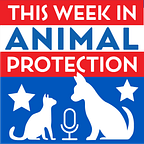
These are some of the stories making headlines in animal protection:
Subscribers can also listen to the podcast above, which includes extended commentary on many issues, including the jaw-dropping idea for shelters to breed dogs themselves or partner with breeders, while killing rescued animals.
“The popular Seresto flea-and-tick collar should be recalled following research showing the roughly $70 device poses risks to pets and their owners, according to a new congressional report. The findings link the collar to almost 100,000 incidents and 2,500 pet deaths.”
The conclusion is based on “a 16-month investigation by the Committee on Oversight and Reform’s Subcommittee on Economic and Consumer Policy into the safety of the Seresto flea and tick collar.” The Committee found that the collar was rushed to market, despite EPA misgivings, numerous complaints (which underestimated the number of dogs harmed or killed), and the fact that other countries, like Canada, ban the collar due to safety concerns.
Last year, a class-action lawsuit was filed against the makers of Seresto flea and tick collars for false advertising, fraudulent misrepresentation, and other consumer protection claims.
The company vigorously denies the allegations, saying the complaints represent “the number of reports received, and do not reflect causality.”
China’s Yulin Dog Festival drew thousands of cruel people to the City to beat thousands of dogs to death, bleed them out, and eat them. “The festival, which began more than a decade ago, is spread out over the course of 10 days, with visitors coming to eat delicacies such as dog meat stew and crispy dog meat.”
It is a celebration of heartbreaking cruelty and depravity, but hundreds of dogs were spared when dog advocates intervened. After complaints by an animal protection group, Chinese police “intercepted a truck carrying 386 dogs” on its way to Yulin. The dogs “were crammed into wire cages in poor conditions. On discovering the truck last weekend, animal rights’ activists worried that some of them may be suffering from infectious diseases. So they reported the truck to the police, citing the country’s legislations on epidemic prevention.”
“It was horrifying to see so many dogs in such an appalling state, it was like a truck from hell for these poor animals,” one of the advocates noted. “Dog meat slaughter brings shame on our country and so we will keep fighting until we see an end to this suffering.” After quarantine, the dogs were relinquished to a dog rescue group.
All told, “around 10 million dogs and four million cats are killed for their meat every year in China. But polling suggests that dog meat is eaten only by a small portion of the Chinese population, while a 2016 survey found that more than half of Chinese people think the dog meat trade should be banned.”
As reported earlier, 16 U.S. senators asked the Biden Administration to support the animals, and the will of California residents, in defending Proposition 12 before the U.S. Supreme Court. The Trump Administration previously sided with industry.
Overwhelmingly passed by voters, Prop. 12 prohibits the sale of pigs, cows, and eggs when the animals were subjected to “extreme methods of farm animal confinement.” Tragically, the Biden Administration also chose to side with those who abuse and kill pigs for food. In an amicus brief filed with the Supreme Court, the Administration argued that California “has no legitimate interest in protecting the welfare of animals located outside the state.”
If the Supreme Court reverses the lower courts by adopting the industry’s expansive reading of the Commerce Clause, it might also impact state laws that ban the retail sale of commercially-bred dogs, cats, and rabbits in pet stores, as well as other efforts to protect animals.
The number of colleges with pet-friendly dorms is increasing. In addition to the University of Maine and Nicholls State in Louisiana, which recently opened up to pets, add one more: SUNY Canton is “launching a dog-friendly housing option” this fall.
“The program builds upon the popularity of the college’s long-running pet-friendly residence hall, called the Pet Wing, which started in 1997.
“The Pet Wing... allows small animals, such as cats, rabbits, fish and hamsters. Now, companion canines will be welcome.”
As more people turn to rescue and adoption and more shelters embrace progressive policies, the number of communities placing over 95% and as high as 99% of the animals is increasing:
Chippewa County, MI, reported a 98% placement rate for dogs, 99% for cats, and 100% for rabbits and other animals.
These communities and national data prove that animals are not dying in pounds because there are too many, too few homes, or people don’t want the animals. They are dying because people in those pounds are killing them. Replace those people, implement the No Kill Equation, and we can be a No Kill nation today.















